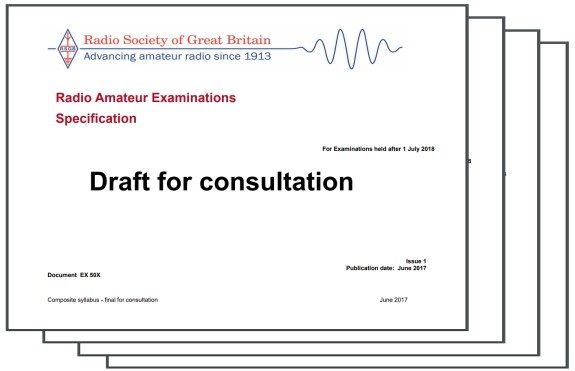The RSGB exam syllabus is set to change. Following our Syllabus Review summary in June, I thought those interested in training would appreciate an update on the upcoming changes.
In June 2017, the RSGB released a draft version of the proposed new syllabus. I condensed the document down to the essential changes, which generated quite a lot of interest (See Syllabus Review Comments)
The RSGB received over 200 responses. Our own survey elicited over 275 comments, and we also run a tutor’s straw poll. As a result of the extensive feedback received and a formal submission from Essex Ham, I was invited to present the findings at an RSGB Exam Group review meeting in late July 2017.
Recent updates in Radcom and at the RSGB Convention have yielded some additional information, which you’ll find summarised here.

Review Status
It’s looking likely that the new syllabus will be finalised by the end of 2017, with the first exams based on the new syllabus in January 2019.
Interestingly, the RSGB August 2017 Board Minutes say that the next step is “a wider consultation”. The RSGB’s Exam Group have a different view, stating that the draft is “with Exam Standards Committee and Ofcom for approval / final amendments”. I queried the Board’s comments at the Exam Group forum in October, and was told “no more consultations”. As for why there’s a Board discrepancy, the answer was “Pass!”
Changes to Foundation
As a result of consultation feedback, many of the proposed changes to Foundation appear to have been reversed. There’s still additional content for tutors to factor in, plus changes to practicals. Here’s a summary
- Licensing – some simple items brought down from Intermediate
- Technical – Some material from Intermediate, but not as much as shown in the consultation document
- Transmitters & Receivers – SSB, basics of analogue vs digital, introduction of SDR
- Feeders & Antennas – Adding Twin feeders & polar diagrams
- Operating – Digital voice & satellites
- Safety – Tool handling, ladders & soldering brought from Intermediate
Changes to Intermediate
Some items brought down from Advanced to equalise steps. Also adding SDR block diagram and the concept of Frequency & Time domain.
Changes to Advanced
Little change. Updates for analogue-to-digital conversion, Fourier transform, SDR, EME/Auroral propagation & risk assessments.
Practicals
At Foundation, there are two likely changes:
1. Morse OR Digital – Morse Appreciation is now optional. For clubs without Morse expertise, a club could elect to do an alternative Digital QSO. In other words, it’s either Morse or a data mode.
It’s not entirely clear what constitutes a “digital QSO”. It’s explicitly not DV (DMR, D-Star, Fusion), so presumably PSK31, JT65, RTTY or SSTV would qualify. But how far do you go?
- Does RSGB mean that each candidate needs to set up and configure a data setup (PC<>rig interface, CAT config, baud rate, sound card, COM ports, PTT, init strings, software and macro setup) and a live QSO (probably on HF) – If so, doing that with multiple candidates will take up a lot of time on a busy training course
- Or can the trainer set everything up for the students, then walk them through a macro-driven QSO – In which case, like Morse, it’s a “data appreciation” and the students won’t learn enough out data modes for the exercise to be useful
2. Resistors Practical – A new practical, involving connecting battery, LED and resistors.No more details at the moment, and I’m not sure what the relevance or justification is for this additional overhead on Foundation courses.
That’s the latest as I understand it. Hopefully, the update is of use.
Pete M0PSX
Any questions or comments, please add them below, or if you’re a tutor, join our new UK Amateur Radio Training Facebook Group.


Inclusion of the Resistors / LED Practical is good because the CEPT Amateur Radio Novice Examination Syllabus, ERC REPORT 32, specifies that the criteria for a Novice Exam includes Components, see
http://www.erodocdb.dk/Docs/doc98/official/pdf/ERCREP032.PDF
No-one ever fails a Practical but people have been known to mark the wrong box when under pressure in the Exam room, so it could be argued it’s better to have it as a Practical rather than part of the written exam.
73 Trevor M5AKA